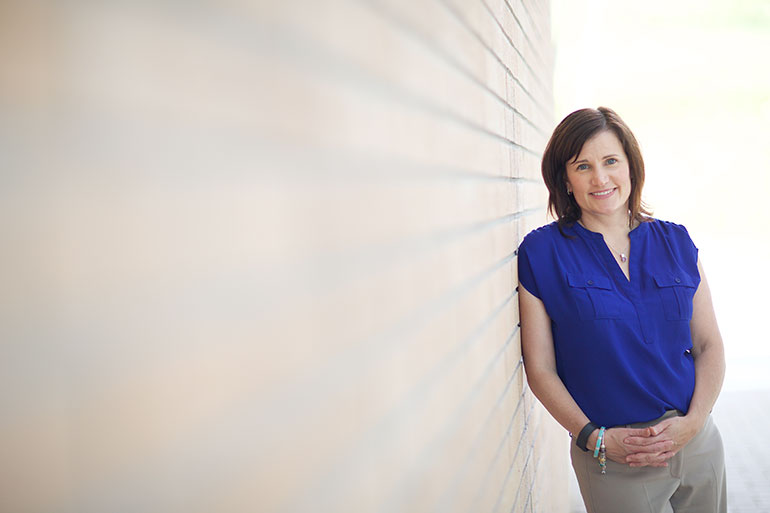
Lesley Lutes is a professor of psychology and director of clinical training at UBC Okanagan, as well as director of public advocacy for the BC Psychological Association (BCPA).
Successful BC psychological first-aid program to be replaced with two online options
It was nearing the end of March—and Lesley Lutes recalls noticing a shift in attitudes from those who thought the COVID-19 outbreak would be short-lived.
Lutes, professor of psychology and director of clinical training at UBC Okanagan, as well as director of public advocacy for the BC Psychological Association (BCPA), anticipated the coronavirus—and its mental health implications—would be here for an extended period of time, motivating her to begin work recruiting fellow psychologists to offer free teletherapy services to front-line and essential workers.
Ultimately recruiting more than 250 psychologists, Lutes was able to expand the service in April to all British Columbians—completely free of charge.
Each caller shared their COVID-19 story with a registered psychologist, and according to Lutes, over two-thirds of callers have been classified as experiencing moderate levels of distress.
“We’ve received calls ranging from general anxiety to acute homicide and domestic abuse issues, suicide risks and front-line workers who took the virus home to family members,” she says.
“What concerns me most is the high number of callers, mostly from the general population, in moderate distress. Without proper access to evidence-based resources, prevention and intervention services along with follow-up, these individuals may experience a further decline in their mental health.”
This is consistent with what Lutes and colleagues found in a review paper currently in Psynopsis, Canada’s Psychology Magazine, which looked at the mental health impacts and evidence-based solutions to address the long-term implications of COVID-19.
“After reviewing the data, both from the teletherapy service and the psychological impacts and implications globally, it’s clear that people are in need of the next step in care,” says Lutes. “The telephone-based service was the first step, but many folks are now in need of skills for psychological recovery or intervention.”
This extreme need for continued mental health support has driven Lutes to transition the temporary teletherapy line—ceasing operations on July 31—into two online solutions.
Thanks to private donor funding, university support and partnerships with BCPA, Vancouver Coastal Health and Kelty’s Key, a virtual walk-in well-being clinic and an email-assisted online therapy program are now being offered.
“These partnerships enable us to offer these supports for free and deliver them in a virtual, distance-learning format, making them accessible to all British Columbians regardless of income or postal code,” says Lutes.
UBCO’s walk-in well-being clinic provides patients with a 30-minute consultation via web or phone. The sessions will be conducted by a doctoral student in clinical psychology and supervised by a registered psychologist. Sessions are aimed at providing support, resources and, if needed, referral for short-term psychological recovery sessions.
Kelty’s Key is an evidence-based online therapy program created by psychologists at Vancouver Coastal Health. It is also run by graduate students and overseen by registered psychologists, uses the principles of cognitive behavioural therapy, and focuses on learning new skills and developing effective coping strategies.
“Virtual support creates instant equity, access and care—and creates a lifeline for those unable to afford psychological services. At the same time, we are training the next generation of registered psychologists.”
Lutes, however, is the first to acknowledge that this is temporary, and given its limited capacity can only provide care to a fraction of those in need—prompting her to continue working with all levels of government and stakeholders to find longer-term solutions.
“The United Nations has warned that a mental health crisis is looming—and that’s completely understandable,” she says.
“COVID-19 has cost us family members, livelihoods, social interactions and much more. If we truly want to rebound from these catastrophic losses—investing in mental health is how we get there.”
About UBC's Okanagan campus
UBC’s Okanagan campus is an innovative hub for research and learning founded in 2005 in partnership with local Indigenous peoples, the Syilx Okanagan Nation, in whose territory the campus resides. As part of UBC—ranked among the world’s top 20 public universities—the Okanagan campus combines a globally recognized UBC education with a tight-knit and entrepreneurial community that welcomes students and faculty from around the world in British Columbia’s stunning Okanagan Valley.
To find out more, visit: ok.ubc.ca
 Best surfers in Canada
Best surfers in Canada Guilty in fatal shooting
Guilty in fatal shooting ICBC warns teens for prom
ICBC warns teens for prom Healing lodges underfunded
Healing lodges underfunded Liberals turn to influencers
Liberals turn to influencers Senators reject field trip
Senators reject field trip Dies after self-immolation
Dies after self-immolation Israeli strike played down
Israeli strike played down Full Trump jury seated
Full Trump jury seated Lululemon cuts 100 jobs
Lululemon cuts 100 jobs Bitcoin's 'halving' arrives
Bitcoin's 'halving' arrives Lawsuit over missing nuts
Lawsuit over missing nuts Rockets season ends in PG
Rockets season ends in PG Warriors bounced in opener
Warriors bounced in opener Warriors ready for Round 2
Warriors ready for Round 2 Pulp Fiction turns 30
Pulp Fiction turns 30 Chris Pratt injured in movie
Chris Pratt injured in movie My name is not Elaine
My name is not Elaine




